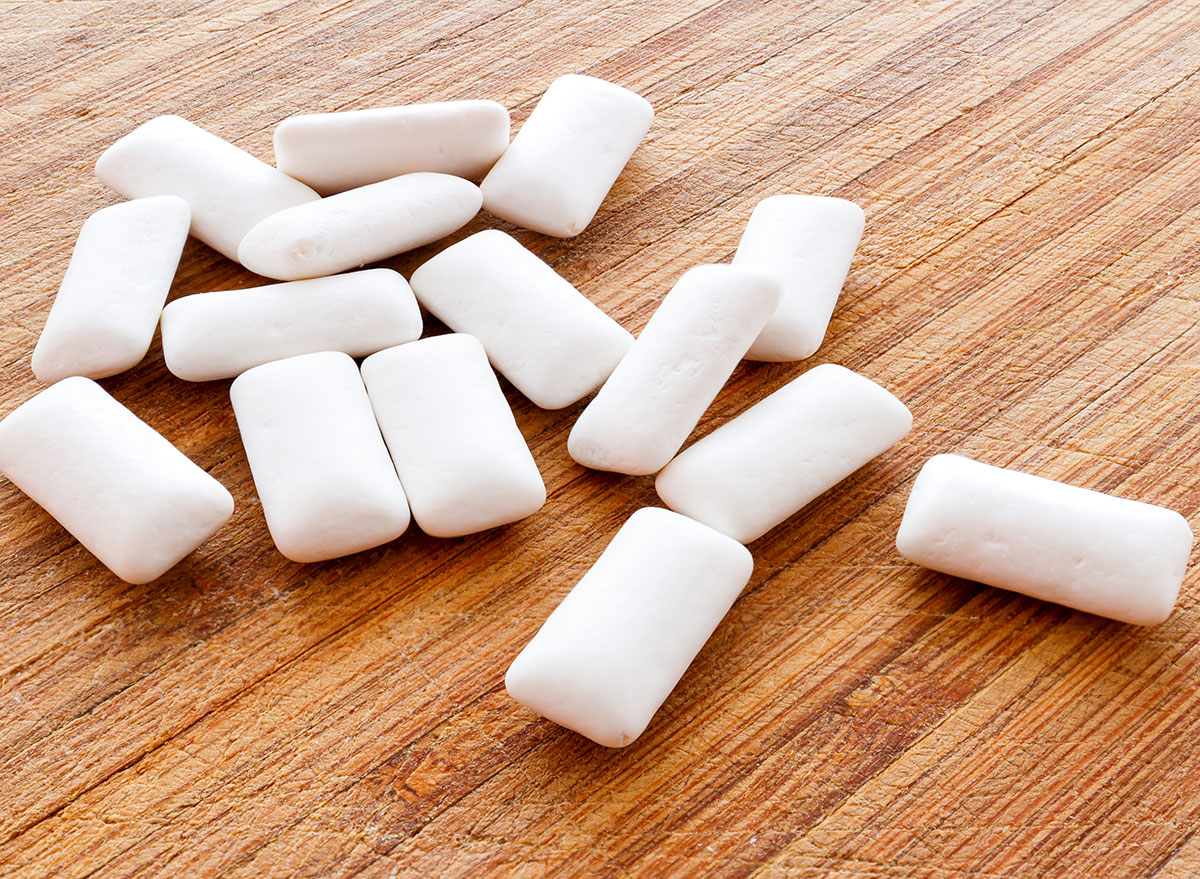This Is What Swallowing Chewing Gum Does to Your Body, Says Science

We hate to burst your bubble, but your favorite schoolyard myth—that swallowing a mouthful of Yubble Bubble or Big League Chew results in undigested chewing gum residing in your stomach for seven years—isn’t true. (Also, for what it’s worth, consuming Pepsi and Pop Rocks together won’t cause your stomach to explode; hurling yourself all the way over the playground swing set won’t cause your body to turn inside-out; and if someone slaps your back while you’re crossing your eyes, they likely won’t get stuck that way.)
But what actually happens to your body if you were to actually swallow your chewing gum? Would it live in your stomach for hours, days, or even weeks? Would that chewy confection clog your intestinal tract? Will it stick to the walls of your stomach like it does to the bottoms of your shoes? And, ultimately, will it cause your body harm? Read on to find out the truth about what swallowing chewing gum does to your insides. And for more health knowledge, make sure you know The One Side Effect of Walking Every Day, Says New Study.
Your body gets to work breaking it down.

Many lasting myths contain a kernel of truth, and the myth that gum lives in your body for seven years is no exception. The truth is, your body can’t actually digest all your chewing gum. “The gum base is insoluble, just like the fiber base of raw vegetables, corn, popcorn kernels, and seeds,” says Nancy McGreal, M.D., a pediatric gastroenterologist at Duke University Health. “Our bodies do not possess digestive enzymes to specifically break down gum base.”
After you swallow regular food, the enzymes in your digestive system break down carbs into sugars (or glucose), proteins into amino acids, and fats into fatty acids. Throughout your digestive tract, bacteria will take a lot of the nutrients from your food and start to transport them into your body, and your hormone insulin kicks into gear to direct all of that broken-down glucose, amino acids, and fatty acids into your muscles and tissues, where it will be either burned off as energy or stored as fat.
Your chewing gum? Well, not so much. While your body can handle breaking down and dealing with the preservatives, flavorings, sugar, and sweeteners, as Dr. McGreal noted, it can’t handle the gum base. That just gets lumped in with the other stuff in your stomach (no, for the record, it won’t stick to anything), and will move through your body at the speed of everything else.
Though rare, swallowing gum can cause intestinal blocking.

“On very rare occasions, large amounts of swallowed gum combined with constipation have blocked intestines in children,” says Elizabeth Rajan, M.D., of the Mayo Clinic. “It’s for this reason that frequent swallowing of chewing gum should be discouraged, especially in children.”
A much-publicized article published in the journal Pediatrics, in 1998, told the story of a child who ate upwards of seven pieces of gum every day and experienced constipation issues for more than two years and eventually required surgery to remove the obstruction.
Repeatedly swallowing chewing gum can lead to painful issues.

Regardless of your age, if you’re repeatedly swallowing an excessive amount of chewing gum, the researchers at Healthline say that you’re putting yourself at risk of abdominal pain, gas, diarrhea, chronic constipation, and mouth ulcers.
How Long Does It Take Chewing Gum to Pass Through Your Body?

According to the health experts at Yale University, it takes roughly 40 hours to seven days. “Gum is pretty immune to the digestive process,” noted David Milov, MD, a pediatric gastroenterologist at the Nemours Children’s Clinic in Orlando, Florida. “It probably passes through slower than most foodstuffs, but eventually the normal housekeeping waves in the digestive tract will sort of push it through, and it will come out pretty unmolested.” For more fascinating facts about your body, be sure to read about What Happens to Your Body When You Eat Peanut Butter Every Day.








